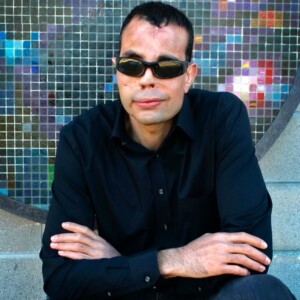Qusay Hussein is an education advocate, doctoral student, and motivational speaker. In 2006, Qusay was a victim of a suicide bomb in Mosul, Iraq where he suffered multiple injuries and lost his sight. After 67 reconstructive surgeries, Qusay was able to overcome this traumatic experience and use it to advocate on behalf of marginalized communities and individuals with disabilities globally. Qusay sought medical treatment in Jordan and had an opportunity to serve as a patient-counselor for Doctors Without Borders/Medecins Sans Frontiere (MSF). During his time with MSF, Qusay organized recreational activities for patients recovering from war-related injuries.
From those traumatic beginnings, Qusay has become an advocate and a spokesperson for organizations serving marginalized communities including those with disabilities, and refugees. He found a home at the University of Texas where he earned dual undergraduate degrees in Social Work and a Master of Social Work degree from the Steve Hicks School of Social Work, where is currently pursuing his PhD. At UT, Qusay worked as a research assistant within the former Office of the Associate Dean of Equality Diversity, and Inclusion. In the fall of 2022, he was a teaching assistant for Leadership Training and Autism and Nuerodevelopmental Disabilities, Crisis and Disability, and Sexuality and Disability. In the spring, he was a TA for the ACT LEND program and Social Construction of Disability at the School of Social Work. Additionally, he serves on the DEI board for the national office of Doctors Without Borders, DEIUSA. His community service is dedicated to a Diverse Socializing Organization in Austin , a networking group he founded with local community members.
Qusay currently serves on numerous committees and boards of directors including, the Association Committee for Doctors Without Borders, the Advisory Committee for Refugee Services of Texas, and the UT Austin Student Advisory Committee for students with disabilities. Qusay has spoken in front of a wide range of audiences – from community organizations to universities including the United States Naval Academy at Annapolis, The University of Texas at Austin and various humanitarian organizations across the world. His story has been featured in the New York Times and BBC among other major media outlets.
Media Appearances include:
- Navanayagam, D. (2021, August 5). “I saw a smile on the suicide bomber’s face.” BBC News.
- Segalov, M. (2019, November 3). “I Was Given a Second Chance.” The Guardian.
- Allamehzadeh, N. (Director). (2019). Open My Eyes [Film]. Doctors Without Borders.
Presentations include:
- (2022). Resilience Rising: Forging Through Adversity. Conference Panelist, United States Naval Academy Leadership Conference. Annapolis, Maryland
- (2021). Building Relationships Between Doctors and Patients. Panelist, Mohammed Bin Rashid School of Communications of the American University at Dubai. Dubai, Jordan
- (2019). How to Work with Patients. Working Behind the Scenes, Doctors Without Borders Conference, Manhattan, New York
- (2019). Why are There So Many Misconceptions about Refugees and People with Disabilities? Refugee Mental Health Conference, Houston, Texas


